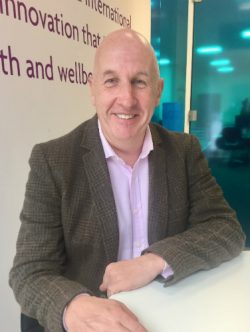This website uses cookies so that we can provide you with the best user experience possible. Cookie information is stored in your browser and performs functions such as recognising you when you return to our website and helping our team to understand which sections of the website you find most interesting and useful.
24 Oct 2018
Dr Lloyd Gregory — The vital role of basic science in translational research

I have always considered myself to be a translational researcher from my humble beginnings, as PhD student exploring the use of MR imaging techniques to chart the temporal evolution of cerebral ischaemia, to understanding the mechanisms of human visceral pain and how these can be modulated by psychological and pharmacological means. As I write this blog, I am embarrassed to say that I have never taken the time to really, and I mean really, consider the vital role that basic science plays in the translational and clinical research journey.
As the operational lead for the University of Manchester’s Wellcome Trust funded Institutional Partnership Award, designed to unblock bottlenecks to translational research, I lead a small team of Translational Research Facilitators whose sole purpose is to seek out those annoying bottlenecks and then work with our basic and translational researchers to unblock them. This week, I had the pleasure of attending two brilliant events that really hammered home the vital role that fundamental science plays in determining the direction of travel that translational and clinical research takes. I was also aware of the sheer joy that our discovery scientists feel on a day to day basis as they get to ask the fundamental questions like “what if…?” and “I wonder what happens when…?”
The first was a showcase of the many applications of graphene that I literally stumbled into after rather unceremoniously kicking over someone’s (thankfully) empty mug of coffee as I entered the room to take my seat. The event highlighted a number of healthcare applications that included exploiting graphene’s high electrical conductivity in the design of novel diagnostics; adding it to other materials to create a composite material to manufacture potential surgical instruments or its utility as a potential tissue scaffold. I was then excited to learn about how our graphene scientists are exploring its interaction with stem cells. One can only begin to imagine the clinical utility of this technology. As each speaker presented, I witnessed the sheer excitement they felt as they described how they had set out on their voyage of scientific discovery and I found myself feeling slightly jealous that they get to ‘blue sky’ think on a daily basis.
The very next day, I was invited to attend the launch of the Lydia Becker Institute for Immunology and Inflammation. Home to internationally renowned immunology and inflammation expertise in large number of basic and applied disciplines, the institute undertakes fundamental and translational science using the very latest technologies to address new concepts in health and a number of areas of unmet clinical need. Working across boundaries, the institute harnesses complexity in tissues and disease to drive meaningful discovery. Once again, I was amazed by the breadth of research within the institute (barrier immunology, cancer immunology, cardiovascular and obesity immunology, neuro-immunology, immune tolerance and matrix, to name but a few) but perhaps more importantly how the institute has brought together basic and clinical scientists to really get to the heart of many clinical problems. Once again, the ‘Green-eyed monster’ was lurking in the back of my mind as I learned more about the people and its work. The day exemplified everything that is great about the ethos of collaboration at the University of Manchester (in this case providing the pump priming funds to establish the institute, that has brought this amazing team together). I also want to comment on the philosophy of the Institute’s leadership team who are ‘bang on the money’ in terms of its strategic direction – hats off to you, Professor Tracy Hussell et al!
For me, there were two further highlights to that day, the first was the Institute’s inaugural inflammatory remarks seminar given by Professor Dan Davis that highlighted beautifully the strength of fundamental and clinical science collaboration. As an individual with the attention span of gnat, I was completely engrossed as Dan spoke with such passion for his subject and the great things that can be done when we work with fundamental/basic scientists. The other highlight was a conversation over lunch with Professor Karl Kadler who reminded me why blue sky thinking was so important and how he will continue to champion basic science at the University.
It’s strange how a set of circumstances, in my case two events which on the face of it, were unrelated to one another, can lead to what really is an obvious conclusion. I am grateful that serendipity played a major role in this personal realisation, but actually, isn’t that what often happens, particularly in the research world and how lucky are our fundamental/basic scientists to be there when it does?




